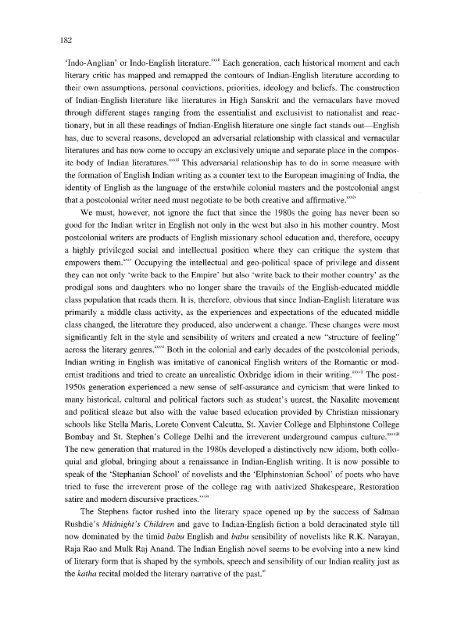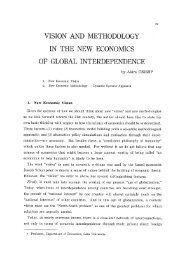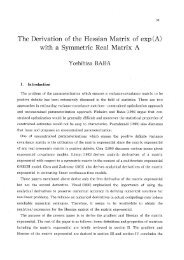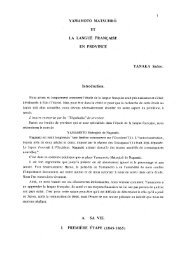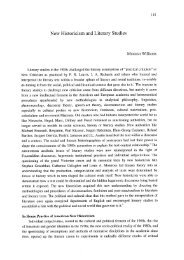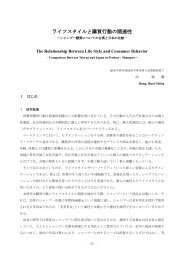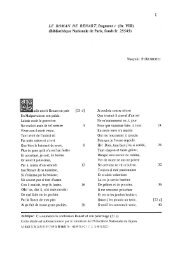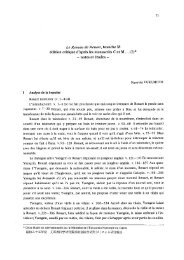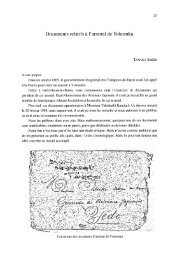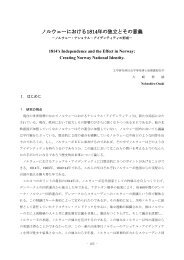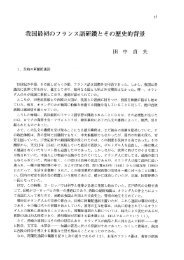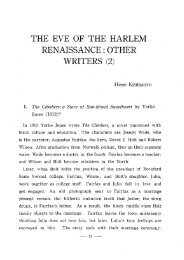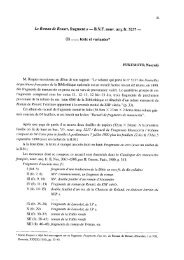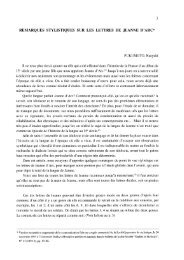Indian Writing in English 1794-2004 - Soka University Repository
Indian Writing in English 1794-2004 - Soka University Repository
Indian Writing in English 1794-2004 - Soka University Repository
Create successful ePaper yourself
Turn your PDF publications into a flip-book with our unique Google optimized e-Paper software.
182<br />
Indo-Anglian' or Indo-<strong>English</strong> literature." Each generation, each historical moment and each<br />
literary critic has mapped and remapped the contours of <strong>Indian</strong>-<strong>English</strong> literature accord<strong>in</strong>g to<br />
their own assumptions, personal convictions, priorities, ideology and beliefs. The construction<br />
of <strong>Indian</strong>-<strong>English</strong> literature like literatures <strong>in</strong> High Sanskrit and the vernaculars have moved<br />
through different stages rang<strong>in</strong>g from the essentialist and exclusivist to nationalist and reac-<br />
tionary, but <strong>in</strong> all these read<strong>in</strong>gs of <strong>Indian</strong>-<strong>English</strong> literature one s<strong>in</strong>gle fact stands out—<strong>English</strong><br />
has, due to several reasons, developed an adversarial relationship with classical and vernacular<br />
literatures and has now come to occupy an exclusively unique and separate place <strong>in</strong> the compos-<br />
ite body of <strong>Indian</strong> literatures.XXX"' This adversarial relationship has to do <strong>in</strong> some measure with<br />
the formation of <strong>English</strong> <strong>Indian</strong> writ<strong>in</strong>g as a counter text to the European imag<strong>in</strong><strong>in</strong>g of India, the<br />
identity of <strong>English</strong> as the language of the erstwhile colonial masters and the postcolonial angst<br />
that a postcolonial writer need must negotiate to be both creative and affirmative.—<br />
We must, however, not ignore the fact that s<strong>in</strong>ce the 1980s the go<strong>in</strong>g has never been so<br />
good for the <strong>Indian</strong> writer <strong>in</strong> <strong>English</strong> not only <strong>in</strong> the west but also <strong>in</strong> his mother country. Most<br />
postcolonial writers are products of <strong>English</strong> missionary school education and, therefore, occupy<br />
a highly privileged social and <strong>in</strong>tellectual position where they can critique the system that<br />
empowers them."-" Occupy<strong>in</strong>g the <strong>in</strong>tellectual and geo-political space of privilege and dissent<br />
they can not only 'write back to the Empire' but also `write back to their mother country' as the<br />
prodigal sons and daughters who no longer share the travails of the <strong>English</strong>-educated middle<br />
class population that reads them. It is, therefore, obvious that s<strong>in</strong>ce <strong>Indian</strong>-<strong>English</strong> literature was<br />
primarily a middle class activity, as the experiences and expectations of the educated middle<br />
class changed, the literature they produced, also underwent a change. These changes were most<br />
significantly felt <strong>in</strong> the style and sensibility of writers and created a new "structure of feel<strong>in</strong>g"<br />
across the literary genres.x' Both <strong>in</strong> the colonial and early decades of the postcolonial periods,<br />
<strong>Indian</strong> writ<strong>in</strong>g <strong>in</strong> <strong>English</strong> was imitative of canonical <strong>English</strong> writers of the Romantic or mod-<br />
ernist traditions and tried to create an unrealistic Oxbridge idiom <strong>in</strong> their writ<strong>in</strong>g.XXx`' The post-<br />
1950s generation experienced a new sense of self-assurance and cynicism that were l<strong>in</strong>ked to<br />
many historical, cultural and political factors such as student's unrest, the Naxalite movement<br />
and political sleaze but also with the value based education provided by Christian missionary<br />
schools like Stella Maris, Loreto Convent Calcutta, St. Xavier College and Elph<strong>in</strong>stone College<br />
Bombay and St. Stephen's College Delhi and the irreverent underground campus culture.--<br />
The new generation that matured <strong>in</strong> the 1980s developed a dist<strong>in</strong>ctively new idiom, both collo-<br />
quial and global, br<strong>in</strong>g<strong>in</strong>g about a renaissance <strong>in</strong> <strong>Indian</strong>-<strong>English</strong> writ<strong>in</strong>g. It is now possible to<br />
speak of the `Stephanian School' of novelists and the `Elph<strong>in</strong>stonian School' of poets who have<br />
tried to fuse the irreverent prose of the college rag with nativized Shakespeare, Restoration<br />
satire and modern discursive practices:—<br />
The Stephens factor rushed <strong>in</strong>to the literary space opened up by the success of Salman<br />
Rushdie's Midnight's Children and gave to <strong>Indian</strong>-<strong>English</strong> fiction a bold derac<strong>in</strong>ated style till<br />
now dom<strong>in</strong>ated by the timid babu <strong>English</strong> and babu sensibility of novelists like R.K. Narayan,<br />
Raja Rao and Mulk Raj Anand. The <strong>Indian</strong> <strong>English</strong> novel seems to be evolv<strong>in</strong>g <strong>in</strong>to a new k<strong>in</strong>d<br />
of literary form that is shaped by the symbols, speech and sensibility of our <strong>Indian</strong> reality just as<br />
the katha recital molded the literary narrative of the past.'


